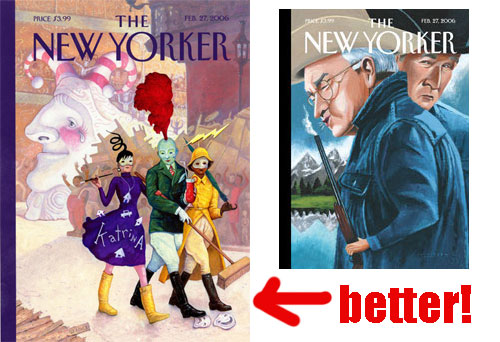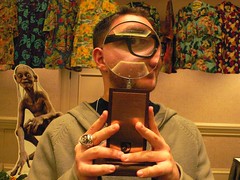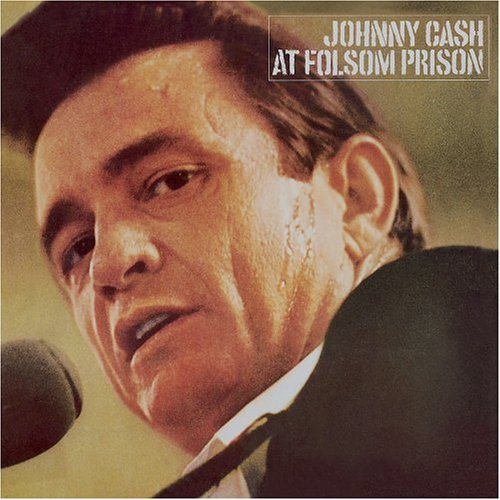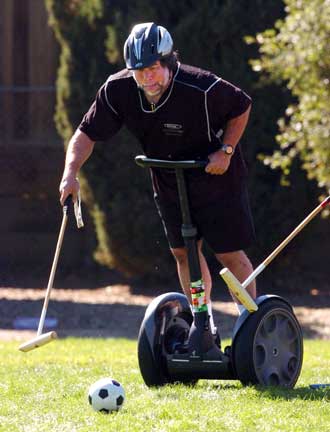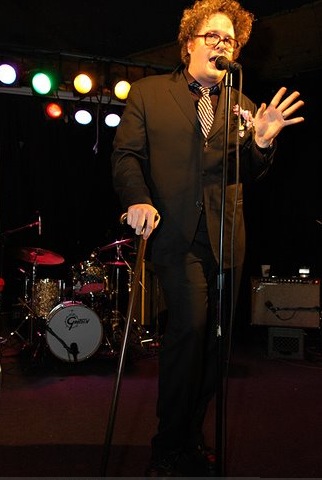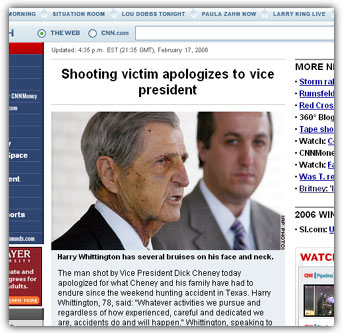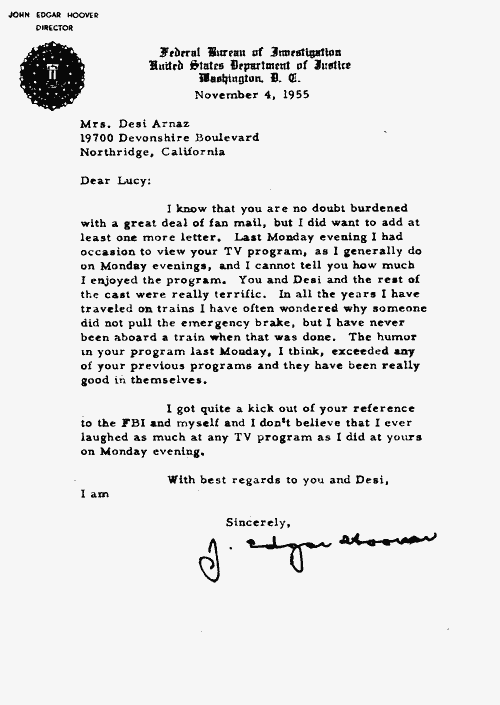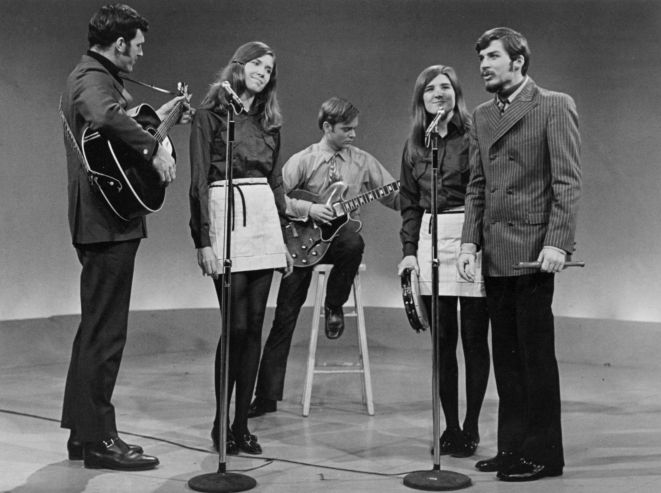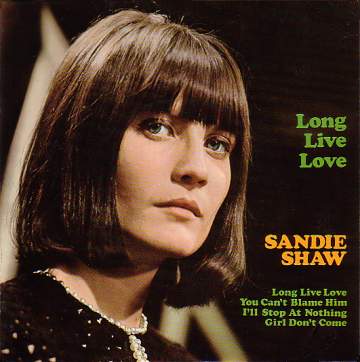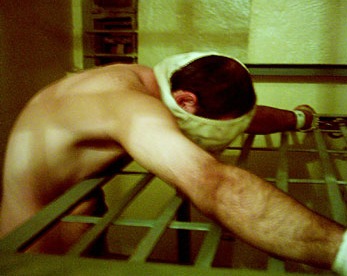
Tuesday, February 28, 2006
Raph’s Website » What are the lessons of MMORPGs today?
Raph’s Website » What are the lessons of MMORPGs today?:
Lone heroes can’t slay dragons. It takes an army.
People are only good at one thing.
That’s why it takes six people (all doing different jobs) to kill most anything.
You never, ever, ever change jobs. If you want to, you probably need to die.
You can be the best in the world at your job.
But so can everyone else.
And you will all do it exactly the same way.
Intelligent beings who have civilizations and languages of their own are generally evil and should be slain.
Lone heroes can’t slay dragons. It takes an army.
People are only good at one thing.
That’s why it takes six people (all doing different jobs) to kill most anything.
You never, ever, ever change jobs. If you want to, you probably need to die.
You can be the best in the world at your job.
But so can everyone else.
And you will all do it exactly the same way.
Intelligent beings who have civilizations and languages of their own are generally evil and should be slain.
Monday, February 27, 2006
'Pizza pope' builds a Catholic heaven - Sunday Times - Times Online
'Pizza pope' builds a Catholic heaven - Sunday Times - Times Online:
A FORMER marine who was raised by nuns and made a fortune selling pizza has embarked on a £230m plan to build the first town in America to be run according to strict Catholic principles.
Abortions, pornography and contraceptives will be banned in the new Florida town of Ave Maria, which has begun to take shape on former vegetable farms 90 miles northwest of Miami.
A FORMER marine who was raised by nuns and made a fortune selling pizza has embarked on a £230m plan to build the first town in America to be run according to strict Catholic principles.
Abortions, pornography and contraceptives will be banned in the new Florida town of Ave Maria, which has begun to take shape on former vegetable farms 90 miles northwest of Miami.
defective yeti: Sark Defends Port Deal
defective yeti: Sark Defends Port Deal:
Sark today sought to quell the growing controversy over his decision to grant the MCP control of several major ports throughout the region.
"I believe that this arrangement with the Master Control Program should go forward," Sark told reporters aboard Solar Sailer One. He emphasized that security would continued to be handled by Tank and Recognizer programs, with the MCP only be in charge of port operations.
But Dumont, guardian of the I/O towers, voiced skepticism. "I could understand ceding authority over ports 21 and 80," said Dumont. "But port 443? That's supposed to be secure!"
Sark today sought to quell the growing controversy over his decision to grant the MCP control of several major ports throughout the region.
"I believe that this arrangement with the Master Control Program should go forward," Sark told reporters aboard Solar Sailer One. He emphasized that security would continued to be handled by Tank and Recognizer programs, with the MCP only be in charge of port operations.
But Dumont, guardian of the I/O towers, voiced skepticism. "I could understand ceding authority over ports 21 and 80," said Dumont. "But port 443? That's supposed to be secure!"
Sunday, February 26, 2006
The Stranger | Seattle | News | City | Key Amendments
The Stranger | Seattle | News | City | Key Amendments:
After nearly 10 years on the council, Licata is still on point. Last month he told Sports Illustrated that if the Sonics made good on their threat to leave town, the economic and cultural impact would be near "zero."
Licata is right to say that professional sports teams are economically irrelevant to cities. An in-depth 2004 study by the Cato Institute (no enemy of business) found that, if anything, professional sports teams may actually hurt local economies. The study debunks industry claims that sports teams generate new consumer spending (they actually just suck up existing discretionary spending), and concludes, "the net economic impact [is] a reduction in real per-capita income over the entire metropolitan area."
...
NBA arenas built before 1960 lasted an average of 59 years. NBA arenas built in the 1960s lasted an average of 30 years. In the 1970s—an average of 25 years. In the 1980s—an average of 20 years. And judging from KeyArena (again revamped in 1995), arenas built in the 1990s last 10 years. Indeed, of the 29 NBA arenas currently in use, the average age is 10 years. Only six have been in service more than 15 years, and most of these are already slated for replacement. Licata laughs: "The evidence shows that the team will be unhappy with a new stadium before it's even built."
After nearly 10 years on the council, Licata is still on point. Last month he told Sports Illustrated that if the Sonics made good on their threat to leave town, the economic and cultural impact would be near "zero."
Licata is right to say that professional sports teams are economically irrelevant to cities. An in-depth 2004 study by the Cato Institute (no enemy of business) found that, if anything, professional sports teams may actually hurt local economies. The study debunks industry claims that sports teams generate new consumer spending (they actually just suck up existing discretionary spending), and concludes, "the net economic impact [is] a reduction in real per-capita income over the entire metropolitan area."
...
NBA arenas built before 1960 lasted an average of 59 years. NBA arenas built in the 1960s lasted an average of 30 years. In the 1970s—an average of 25 years. In the 1980s—an average of 20 years. And judging from KeyArena (again revamped in 1995), arenas built in the 1990s last 10 years. Indeed, of the 29 NBA arenas currently in use, the average age is 10 years. Only six have been in service more than 15 years, and most of these are already slated for replacement. Licata laughs: "The evidence shows that the team will be unhappy with a new stadium before it's even built."
Kathryn Cramer: Watermarking as a Strategy for Insisting on Corporate "Creators": Is DRM the Killer App for Corporate Authorship?
Kathryn Cramer: Watermarking as a Strategy for Insisting on Corporate "Creators": Is DRM the Killer App for Corporate Authorship?:
My experience in the early-mid 90s teaches me that part of the purpose of setting the production standards of early CD-ROMs absurdly high was to promote corporate authorship over individual authorship with the idea that digital products could be authored like film and TV, not like books, thus empowering the executive level and disempowering the actual creators, or rather reconfiguring relations such that executives become part of the creative "team."
Now computers are being sold that allow individuals, and small groups of individuals, to produce works to very high production standards on very low budgets. This also threatens the rise of corporate authorship. So watermark-style DRM may do very little to prevent the "piracy" about which the big media corporations are up in arms, it may be the killer app of corporate authorship.
My experience in the early-mid 90s teaches me that part of the purpose of setting the production standards of early CD-ROMs absurdly high was to promote corporate authorship over individual authorship with the idea that digital products could be authored like film and TV, not like books, thus empowering the executive level and disempowering the actual creators, or rather reconfiguring relations such that executives become part of the creative "team."
Now computers are being sold that allow individuals, and small groups of individuals, to produce works to very high production standards on very low budgets. This also threatens the rise of corporate authorship. So watermark-style DRM may do very little to prevent the "piracy" about which the big media corporations are up in arms, it may be the killer app of corporate authorship.
Saturday, February 25, 2006
Big decision time? Best to sleep on it - Yahoo! News
Big decision time? Best to sleep on it - Yahoo! News:
NEW YORK (Reuters Health) - When faced with a major decision, such as buying a car or a house, it's best to do your homework, and then forget about it for a while and let your unconscious churn through the options.
According to the results of a novel study published today in the journal Science, unconscious deliberation may lead to a more satisfying choice than mere conscious deliberation alone, at least for major decisions.
Conscious deliberation is fine for the less important, more mundane everyday choices like deciding which shampoo or towels to buy, but not for bigger decisions, the report indicates.
NEW YORK (Reuters Health) - When faced with a major decision, such as buying a car or a house, it's best to do your homework, and then forget about it for a while and let your unconscious churn through the options.
According to the results of a novel study published today in the journal Science, unconscious deliberation may lead to a more satisfying choice than mere conscious deliberation alone, at least for major decisions.
Conscious deliberation is fine for the less important, more mundane everyday choices like deciding which shampoo or towels to buy, but not for bigger decisions, the report indicates.
Friday, February 24, 2006
Backup Brain
Why HSA's suck - for most people - Backup Brain:
From personal experience, I can attest that HSA's suck, even if you have a relatively high income, but are not absolutely healthy. In October 2004, we were forced into a high-deductible insurance policy, which is coupled with an HSA. We are financially able to save money to the HSA, but because we have ongoing health care costs, we've needed to draw down the saved funds. The health insurance has paid for exactly nothing in the time that we've had it, though of course we've been paying the premiums. All of our heath costs have come out of our pockets, sometimes (but not always) laundered through the HSA. There are only two "good" things about the insurance. One, we would have 80% coverage in the event of a hospital stay, after paying $4,000 out of pocket (that high deductible). Second, though we pay for virtually all of our health care costs, we pay at the rate that the insurer has negotiated with the providers, so at least we don't pay the full retail price. It's hard to call paying $90 instead of $150 for a routine doctor's visit a terrific deal, compared to the days when we had real health insurance.
Oh, and to get the most out of the policy, you have to be diligent about following all of the famously confusing paperwork and making sure that the insurer has credited all visits towards the deductible. If you want prescription costs to count towards the deductible, you have to keep all the pharmacy receipts, make copies, then submit each receipt as a separate claim. Mind you, you won't get any money back for doing that bookkeeping; it just counts towards the deductible, so if you do get catastrophically sick, it will cost you a bit less out of pocket.
In short, I've already seen the Bush future. It has cost me more money, and I've gotten less health care for that money. It incentivizes me to put off going to the doctor because of the cost, thereby increasing the chance that I'll put off getting early treatment for illness. It's more complicated and bureaucratic. It sucks.
From personal experience, I can attest that HSA's suck, even if you have a relatively high income, but are not absolutely healthy. In October 2004, we were forced into a high-deductible insurance policy, which is coupled with an HSA. We are financially able to save money to the HSA, but because we have ongoing health care costs, we've needed to draw down the saved funds. The health insurance has paid for exactly nothing in the time that we've had it, though of course we've been paying the premiums. All of our heath costs have come out of our pockets, sometimes (but not always) laundered through the HSA. There are only two "good" things about the insurance. One, we would have 80% coverage in the event of a hospital stay, after paying $4,000 out of pocket (that high deductible). Second, though we pay for virtually all of our health care costs, we pay at the rate that the insurer has negotiated with the providers, so at least we don't pay the full retail price. It's hard to call paying $90 instead of $150 for a routine doctor's visit a terrific deal, compared to the days when we had real health insurance.
Oh, and to get the most out of the policy, you have to be diligent about following all of the famously confusing paperwork and making sure that the insurer has credited all visits towards the deductible. If you want prescription costs to count towards the deductible, you have to keep all the pharmacy receipts, make copies, then submit each receipt as a separate claim. Mind you, you won't get any money back for doing that bookkeeping; it just counts towards the deductible, so if you do get catastrophically sick, it will cost you a bit less out of pocket.
In short, I've already seen the Bush future. It has cost me more money, and I've gotten less health care for that money. It incentivizes me to put off going to the doctor because of the cost, thereby increasing the chance that I'll put off getting early treatment for illness. It's more complicated and bureaucratic. It sucks.
BiZBash: Ideas and Resources for Special Events and Meetings
BiZBash: Ideas and Resources for Special Events and Meetings:
The Vanity Fair party at Mortons—with its well-documented reputation as the evening's most exclusive, star-studded party—comes with a price tag estimated at $2 million (the magazine's PR team didn't respond to our requests for comment). In past years, the party has featured a 30-foot-long, 10-foot-tall myrtle topiary in the shape of the magazine's title, lighting by lighting-designer-to-Buckingham-Palace Patrick Woodroffe, and tables set with Asprey accessories and custom-made engraved enamel lighters.
But the price of the party also includes dollars spent long before the doors to Mortons swing open. Condé Nast, the mag's New York publisher, flies as many as 30 staffers to Los Angeles to prepare for as long as three weeks; they stay at the Beverly Hills Hotel and drive rented cars.
The Vanity Fair party at Mortons—with its well-documented reputation as the evening's most exclusive, star-studded party—comes with a price tag estimated at $2 million (the magazine's PR team didn't respond to our requests for comment). In past years, the party has featured a 30-foot-long, 10-foot-tall myrtle topiary in the shape of the magazine's title, lighting by lighting-designer-to-Buckingham-Palace Patrick Woodroffe, and tables set with Asprey accessories and custom-made engraved enamel lighters.
But the price of the party also includes dollars spent long before the doors to Mortons swing open. Condé Nast, the mag's New York publisher, flies as many as 30 staffers to Los Angeles to prepare for as long as three weeks; they stay at the Beverly Hills Hotel and drive rented cars.
The Stranger - Slog
The Stranger - Slog:
Dark Room, the Crispin Spaeth dance piece playing Fridays and Saturdays (three shows per night) through March 4 at Western Bridge. It’s about a half hour long, you sit on bean bags, the place is pitch black, and you’re given night-vision goggles. But the dancers aren’t. They can’t see a damn thing. It’s incredible they’ve figured out how to dance together in the dark — and it’s interesting the way the floor becomes another dance partner, since it’s the only thing they can count on. The music is restrained beeps, beats, shudderings — I kept thinking of Radiohead’s Amnesiac, minus words — and the total effect is spectral and insomniac. When the goggles can’t find any light in the room whatsoever, they fill with this snowy fuzz. After the show, my date and I went out and stood on the train tracks outside Western Bridge and tried to recreate some of the things the dancers had done, but even with the advantage of a nearby streetlight, we couldn’t.
Dark Room, the Crispin Spaeth dance piece playing Fridays and Saturdays (three shows per night) through March 4 at Western Bridge. It’s about a half hour long, you sit on bean bags, the place is pitch black, and you’re given night-vision goggles. But the dancers aren’t. They can’t see a damn thing. It’s incredible they’ve figured out how to dance together in the dark — and it’s interesting the way the floor becomes another dance partner, since it’s the only thing they can count on. The music is restrained beeps, beats, shudderings — I kept thinking of Radiohead’s Amnesiac, minus words — and the total effect is spectral and insomniac. When the goggles can’t find any light in the room whatsoever, they fill with this snowy fuzz. After the show, my date and I went out and stood on the train tracks outside Western Bridge and tried to recreate some of the things the dancers had done, but even with the advantage of a nearby streetlight, we couldn’t.
High costs threaten NYC's creative status
High costs threaten NYC's creative status:
More than 40% of the city’s creative workers made less than $35,000 last year and half have little or no personal savings, according to the poll of 1,200 creative workers. Thirty-nine percent experienced a significant gap in health insurance coverage in the last year and 75% avoided seeking medical care when they were uninsured.
Nearly 10% of the country’s creative sector workers live in New York, but advocates at the Freelancers Union warn that the city’s dominance may be threatened by the high costs. Artists may be forced to leave the city unless a better social net is created.
More than 40% of the city’s creative workers made less than $35,000 last year and half have little or no personal savings, according to the poll of 1,200 creative workers. Thirty-nine percent experienced a significant gap in health insurance coverage in the last year and 75% avoided seeking medical care when they were uninsured.
Nearly 10% of the country’s creative sector workers live in New York, but advocates at the Freelancers Union warn that the city’s dominance may be threatened by the high costs. Artists may be forced to leave the city unless a better social net is created.
Thursday, February 23, 2006
Technology, Technology news, Times Online
Technology, Technology news, Times Online:
A little while ago, I received an e-mail from a lady in the Trading Standards department of a large northern town. They had encountered businesses which were selling copies of Firefox, and wanted to confirm that this was in violation of our licence agreements before taking action against them.
I wrote back, politely explaining the principles of copyleft – that the software was free, both as in speech and as in price, and that people copying and redistributing it was a feature, not a bug. I said that selling verbatim copies of Firefox on physical media was absolutely fine with us, and we would like her to return any confiscated CDs and allow us to continue with our plan for world domination (or words to that effect).
Unfortunately, this was not well received. Her reply was incredulous:
"I can't believe that your company would allow people to make money from something that you allow people to have free access to. Is this really the case?" she asked.
"If Mozilla permit the sale of copied versions of its software, it makes it virtually impossible for us, from a practical point of view, to enforce UK anti-piracy legislation, as it is difficult for us to give general advice to businesses over what is/is not permitted."
I felt somewhat unnerved at being held responsible for the disintegration of the UK anti-piracy system. Who would have thought giving away software could cause such difficulties?
A little while ago, I received an e-mail from a lady in the Trading Standards department of a large northern town. They had encountered businesses which were selling copies of Firefox, and wanted to confirm that this was in violation of our licence agreements before taking action against them.
I wrote back, politely explaining the principles of copyleft – that the software was free, both as in speech and as in price, and that people copying and redistributing it was a feature, not a bug. I said that selling verbatim copies of Firefox on physical media was absolutely fine with us, and we would like her to return any confiscated CDs and allow us to continue with our plan for world domination (or words to that effect).
Unfortunately, this was not well received. Her reply was incredulous:
"I can't believe that your company would allow people to make money from something that you allow people to have free access to. Is this really the case?" she asked.
"If Mozilla permit the sale of copied versions of its software, it makes it virtually impossible for us, from a practical point of view, to enforce UK anti-piracy legislation, as it is difficult for us to give general advice to businesses over what is/is not permitted."
I felt somewhat unnerved at being held responsible for the disintegration of the UK anti-piracy system. Who would have thought giving away software could cause such difficulties?
Wednesday, February 22, 2006
Court Documents: Hospital Gave Lethal Injections to Patients During Hurricane Katrina
Court Documents: Hospital Gave Lethal Injections to Patients During Hurricane Katrina:
The NPR report states, "According to statements given to an investigator in the attorney general's office, LifeCare's pharmacy director, the director of physical medicine and an assistant administrator say they were told that the 'evacuation plan' for the seventh floor was to not leave any living patients behind, and that 'a lethal dose would be administered', according to their statements in court documents."
Commenting, Not Dead Yet, says, "In other words, the only way the staff could evacuate was if they could report there were no more living patients to take care of. This was not about compassion or mercy. It was about throwing someone else over the side of the lifeboat in order to save themselves."
The NPR report states, "According to statements given to an investigator in the attorney general's office, LifeCare's pharmacy director, the director of physical medicine and an assistant administrator say they were told that the 'evacuation plan' for the seventh floor was to not leave any living patients behind, and that 'a lethal dose would be administered', according to their statements in court documents."
Commenting, Not Dead Yet, says, "In other words, the only way the staff could evacuate was if they could report there were no more living patients to take care of. This was not about compassion or mercy. It was about throwing someone else over the side of the lifeboat in order to save themselves."
Performance Space 122 > Performance Page
The Money Conversation:
As seen in The New Yorker:
"...a provocative stunt: over the course of six performances, she is giving away her entire savings (five thousand dollars) to members of the audience. Since Juli also provides a way for people to give the money back, if they wish, or to donate more, each show becomes a moral experiment. There's some movement, some humor, and a lot of audience participation, but a basic idea predominates: a compression of the everyday economic gamble made by all aspiring artists in the big, cruel city."
As seen in The New Yorker:
"...a provocative stunt: over the course of six performances, she is giving away her entire savings (five thousand dollars) to members of the audience. Since Juli also provides a way for people to give the money back, if they wish, or to donate more, each show becomes a moral experiment. There's some movement, some humor, and a lot of audience participation, but a basic idea predominates: a compression of the everyday economic gamble made by all aspiring artists in the big, cruel city."
McSweeney's Internet Tendency: Trying to Translate What My Girlfriend Is Saying in Swedish While She's on the Phone to Her Mother.
Trying to Translate What My Girlfriend Is Saying in Swedish While She's on the Phone to Her Mother.:
The weather here is like a hawk or small factory. Claws grab once and leave things burning, making people go to work while they are deadened from this. Yes, that is the case. That is the omen. When you take a vacation, you know there is hot iron and metal clawing at workers here.
(Pause while her mother comments or asks her something.)
The weather here is like a hawk or small factory. Claws grab once and leave things burning, making people go to work while they are deadened from this. Yes, that is the case. That is the omen. When you take a vacation, you know there is hot iron and metal clawing at workers here.
(Pause while her mother comments or asks her something.)
Read
Stand up for Denmark:
The incredible thing about the ongoing Kristallnacht against Denmark (and in some places, against the embassies and citizens of any Scandinavian or even European Union nation) is that it has resulted in, not opprobrium for the religion that perpetrates and excuses it, but increased respectability! A small democratic country with an open society, a system of confessional pluralism, and a free press has been subjected to a fantastic, incredible, organized campaign of lies and hatred and violence, extending to one of the gravest imaginable breaches of international law and civility: the violation of diplomatic immunity. And nobody in authority can be found to state the obvious and the necessary—that we stand with the Danes against this defamation and blackmail and sabotage. Instead, all compassion and concern is apparently to be expended upon those who lit the powder trail, and who yell and scream for joy as the embassies of democracies are put to the torch in the capital cities of miserable, fly-blown dictatorships. Let's be sure we haven't hurt the vandals' feelings.
The incredible thing about the ongoing Kristallnacht against Denmark (and in some places, against the embassies and citizens of any Scandinavian or even European Union nation) is that it has resulted in, not opprobrium for the religion that perpetrates and excuses it, but increased respectability! A small democratic country with an open society, a system of confessional pluralism, and a free press has been subjected to a fantastic, incredible, organized campaign of lies and hatred and violence, extending to one of the gravest imaginable breaches of international law and civility: the violation of diplomatic immunity. And nobody in authority can be found to state the obvious and the necessary—that we stand with the Danes against this defamation and blackmail and sabotage. Instead, all compassion and concern is apparently to be expended upon those who lit the powder trail, and who yell and scream for joy as the embassies of democracies are put to the torch in the capital cities of miserable, fly-blown dictatorships. Let's be sure we haven't hurt the vandals' feelings.
Boing Boing: Investigative blogger picking at secret "A-Hole" technology
Boing Boing: Investigative blogger picking at secret "A-Hole" technology:
Kathryn Cramer, an investigative blogger, has begun to publish the results of her research into VEIL. VEIL is a technology that the entertainment industry has proposed to turn into a legal requirement for all devices capable of turning an analog signal into a digital one: cameras, recorders and mics of all kinds, in other words. This is to "plug the analog hole."
No one will say how VEIL works, though. As Ed Felten discovered: if you contact the VEIL people and ask for an explanation of how their magic watermarking tech works, they'll charge you $10,000, make you sign a non-disclosure, and then refuse to tell you how the encoding works anyway (they will explain decoding though).
Kathryn Cramer, an investigative blogger, has begun to publish the results of her research into VEIL. VEIL is a technology that the entertainment industry has proposed to turn into a legal requirement for all devices capable of turning an analog signal into a digital one: cameras, recorders and mics of all kinds, in other words. This is to "plug the analog hole."
No one will say how VEIL works, though. As Ed Felten discovered: if you contact the VEIL people and ask for an explanation of how their magic watermarking tech works, they'll charge you $10,000, make you sign a non-disclosure, and then refuse to tell you how the encoding works anyway (they will explain decoding though).
Starting from Scratch
To begin with, none of your neighbors began here.
Everyone moved in years before you moved into
a pattern you found yourself part of
before you intended: flowers, fences,
attention to the details your mother always took care of,
duller than film on dishes it was always your job to wipe.
Nobody spoke about courage.
Nobody said you could choose this life.
It happened, it didn't, the fact
you could choose to remain would become
what's yours to control: hours
of sleeping and waking, meals, the home
you need to go out in the world from.
Neighborhood customs you know you can count on.
Recipes, grapes exchanged for zucchini, the garden
someone will know when to plant.
The book you suggest. The pattern of limits
no one has asked for, told over coffee, lives
like yours you could have become
starting from scratch. Each day
the way you will live before what comes next.
Ingrid Wendt
To begin with, none of your neighbors began here.
Everyone moved in years before you moved into
a pattern you found yourself part of
before you intended: flowers, fences,
attention to the details your mother always took care of,
duller than film on dishes it was always your job to wipe.
Nobody spoke about courage.
Nobody said you could choose this life.
It happened, it didn't, the fact
you could choose to remain would become
what's yours to control: hours
of sleeping and waking, meals, the home
you need to go out in the world from.
Neighborhood customs you know you can count on.
Recipes, grapes exchanged for zucchini, the garden
someone will know when to plant.
The book you suggest. The pattern of limits
no one has asked for, told over coffee, lives
like yours you could have become
starting from scratch. Each day
the way you will live before what comes next.
Ingrid Wendt
Tuesday, February 21, 2006
Metroblogging NYC: Dear Williamsburg,
Metroblogging NYC: Dear Williamsburg,:
I hope you'll forgive me for all those years of mocking, because now I'm so in love with you it's silly. I thought I'd miss tacos when I left LA, but you have great tacos and great bagels and pizza and sushi and coffee and wine, and it's all on the short walk between my apartment and the subway. It's not just the food, though! I love the buckets of flowers outside my deli, and the way all the buildings look against the gray winter sky, and I love that the bar around the corner sometimes serves hot cider with rum. I love the little clothing store where everything I tried on actually fit. I love my friendly landlord and my big apartment and its slanty floor.
I don't know what I was thinking a few years ago, hating the hipsters. Now, I want to hug them all. This afternoon the arty/indie boys were cuter than ever, walking to the subway in their hoodies in the rain. In my iPod-fueled daydreams they're checking me out, too, and they're *this* close to inviting me to their band's next show.
I hope you'll forgive me for all those years of mocking, because now I'm so in love with you it's silly. I thought I'd miss tacos when I left LA, but you have great tacos and great bagels and pizza and sushi and coffee and wine, and it's all on the short walk between my apartment and the subway. It's not just the food, though! I love the buckets of flowers outside my deli, and the way all the buildings look against the gray winter sky, and I love that the bar around the corner sometimes serves hot cider with rum. I love the little clothing store where everything I tried on actually fit. I love my friendly landlord and my big apartment and its slanty floor.
I don't know what I was thinking a few years ago, hating the hipsters. Now, I want to hug them all. This afternoon the arty/indie boys were cuter than ever, walking to the subway in their hoodies in the rain. In my iPod-fueled daydreams they're checking me out, too, and they're *this* close to inviting me to their band's next show.
Monday, February 20, 2006
Alasdair - Pour Him Over Ice Cream For A Nice Parfait
Alasdair - Pour Him Over Ice Cream For A Nice Parfait:
This evening, I spent two hours eating chocolate.
OK, maybe not quite. But I spent two and half hours learning about chocolate, and there was tasting involved. Because [info]zoo_music_girl and I were at a tasting at my favourite chocolate shop in London (and therefore, the world) L'Artisan Du Chocolat, run by the man behind the chocolate, Gerard Coleman.
This evening, I spent two hours eating chocolate.
OK, maybe not quite. But I spent two and half hours learning about chocolate, and there was tasting involved. Because [info]zoo_music_girl and I were at a tasting at my favourite chocolate shop in London (and therefore, the world) L'Artisan Du Chocolat, run by the man behind the chocolate, Gerard Coleman.
A Wake
I Called Michael and he told me he just got home from a
wake. "Oh, I am sorry," I said. "No, no," he said, "it was
the best wake I have ever been to. The funeral home was
as warm and cozy as anyone's living room. We had the
greatest time. My friend looked wonderful, much better
dead than alive. He wore his red and green Hawaiian shirt.
He was the most handsome corpse I'd ever seen.
They did such a good job! His daughter was there and
a lot of old friends I had not seen in years. You know,
he drank himself to death. He'd been on and off the
wagon for years, but for some reason this is what he
ended up doing." As my friend kept talking, I thought
of Lorca and what he wrote about death and Spain: "A
dead man in Spain is more alive as a dead man that any-
place else in the world" and "Everywhere else, death is
an end. Death comes, and they draw the curtains. Not
in Spain. In Spain they open them. Many Spaniards live
indoors until the day they die and are taken out into the
sunlight."
Malena Morling
I Called Michael and he told me he just got home from a
wake. "Oh, I am sorry," I said. "No, no," he said, "it was
the best wake I have ever been to. The funeral home was
as warm and cozy as anyone's living room. We had the
greatest time. My friend looked wonderful, much better
dead than alive. He wore his red and green Hawaiian shirt.
He was the most handsome corpse I'd ever seen.
They did such a good job! His daughter was there and
a lot of old friends I had not seen in years. You know,
he drank himself to death. He'd been on and off the
wagon for years, but for some reason this is what he
ended up doing." As my friend kept talking, I thought
of Lorca and what he wrote about death and Spain: "A
dead man in Spain is more alive as a dead man that any-
place else in the world" and "Everywhere else, death is
an end. Death comes, and they draw the curtains. Not
in Spain. In Spain they open them. Many Spaniards live
indoors until the day they die and are taken out into the
sunlight."
Malena Morling
Sunday, February 19, 2006
New Katrina E-Mails Show White House Chaos - Newsweek Politics - MSNBC.com
New Katrina E-Mails Show White House Chaos - Newsweek Politics - MSNBC.com:
Back at the White House, the job of monitoring the storm was left to Kenneth Rapuano, Townsend's deputy. At 10 p.m., Rapuano left the White House to go home for the night, believing everything was under control.
It wasn't. Half an hour later, at 10:30 p.m., the Homeland Security Operations Center sent out a two-page bulletin reporting massive flooding and bodies floating in the water. Rapuano later told Congress that no one at the White House woke him to tell him about the report, and he didn't realize the extent of the damage until 6 the following morning, when another Homeland bulletin warned that "it could take months to dewater" the city. Only then did it begin to dawn on top administration officials, including the president, how grave a human—and political—disaster they were facing.
Six months later, there still isn't a clear account of what Bush and his top aides were doing in the hours and days after the levees crumbled and the misery set in.
Back at the White House, the job of monitoring the storm was left to Kenneth Rapuano, Townsend's deputy. At 10 p.m., Rapuano left the White House to go home for the night, believing everything was under control.
It wasn't. Half an hour later, at 10:30 p.m., the Homeland Security Operations Center sent out a two-page bulletin reporting massive flooding and bodies floating in the water. Rapuano later told Congress that no one at the White House woke him to tell him about the report, and he didn't realize the extent of the damage until 6 the following morning, when another Homeland bulletin warned that "it could take months to dewater" the city. Only then did it begin to dawn on top administration officials, including the president, how grave a human—and political—disaster they were facing.
Six months later, there still isn't a clear account of what Bush and his top aides were doing in the hours and days after the levees crumbled and the misery set in.
Saturday, February 18, 2006
Hamlet!
Hamlet!:
Hamlet is an abstract strategy game satirically based on one of Shakespeare's most famous works. Each player has a specific ending to the play and they try to manipulate the events of the play to favor their outcome. It is possible for all players to win, or for a game to have no winner.
Hamlet is an abstract strategy game satirically based on one of Shakespeare's most famous works. Each player has a specific ending to the play and they try to manipulate the events of the play to favor their outcome. It is possible for all players to win, or for a game to have no winner.
Houston eyes cameras at apartment complexes
Houston eyes cameras at apartment complexes:
Houston's police chief on Wednesday proposed placing surveillance cameras in apartment complexes, downtown streets, shopping malls and even private homes to fight crime during a shortage of police officers.
"I know a lot of people are concerned about Big Brother, but my response to that is, if you are not doing anything wrong, why should you worry about it?" Chief Harold Hurtt told reporters Wednesday at a regular briefing.
Building permits should require malls and large apartment complexes to install surveillance cameras, Hurtt said. And if a homeowner requires repeated police response, it is reasonable to require camera surveillance of the property, he said.
Houston's police chief on Wednesday proposed placing surveillance cameras in apartment complexes, downtown streets, shopping malls and even private homes to fight crime during a shortage of police officers.
"I know a lot of people are concerned about Big Brother, but my response to that is, if you are not doing anything wrong, why should you worry about it?" Chief Harold Hurtt told reporters Wednesday at a regular briefing.
Building permits should require malls and large apartment complexes to install surveillance cameras, Hurtt said. And if a homeowner requires repeated police response, it is reasonable to require camera surveillance of the property, he said.
Guardian Unlimited Books | By genre | Did you really do that, Dad?
Guardian Unlimited Books | By genre | Did you really do that, Dad?:
My 17-year-old daughter reads an old novel of mine called Goodness: just recently the older kids have started nosing round my work. In this book she will have read sentences such as: "For a while I surrendered to the most vivid erotic images, my tongue pressed against the blue cotton swell of a girl's plump panties, that sort of stuff."
She says: "I really like the bit where the narrator beats the shit out of his miserable old grandfather." "Yes," I say, "that probably was the strongest moment in the book."
My 17-year-old daughter reads an old novel of mine called Goodness: just recently the older kids have started nosing round my work. In this book she will have read sentences such as: "For a while I surrendered to the most vivid erotic images, my tongue pressed against the blue cotton swell of a girl's plump panties, that sort of stuff."
She says: "I really like the bit where the narrator beats the shit out of his miserable old grandfather." "Yes," I say, "that probably was the strongest moment in the book."
FRESH YARN presents Just Like My Daddy... by Kambri Crews
FRESH YARN presents Just Like My Daddy... by Kambri Crews:
Domestic violence laws were much different then -- it was at least five years before Nicole Brown Simpson's murder would change the laws in favor of victims of spousal abuse. When the police arrived, my father was in a calm state and seated at our kitchen table, so the police simply sent him on his way. Minutes later he returned with a vengeance. He busted the front door off its hinges and ripped my phone out of the wall. I made a quick escape and called 911 using another phone. The police arrested him for trespassing, but a day later he was free to continue his harassment.
I thought my cries for help that night had not been heard. I was wrong. We were evicted from our apartment within a week for "excessive noise disturbance." We found a new apartment, and my mom and I went into hiding. A few weeks later I began my senior year of high school with trepidation and fear. Would I be safe at night? Would I go to college?
Domestic violence laws were much different then -- it was at least five years before Nicole Brown Simpson's murder would change the laws in favor of victims of spousal abuse. When the police arrived, my father was in a calm state and seated at our kitchen table, so the police simply sent him on his way. Minutes later he returned with a vengeance. He busted the front door off its hinges and ripped my phone out of the wall. I made a quick escape and called 911 using another phone. The police arrested him for trespassing, but a day later he was free to continue his harassment.
I thought my cries for help that night had not been heard. I was wrong. We were evicted from our apartment within a week for "excessive noise disturbance." We found a new apartment, and my mom and I went into hiding. A few weeks later I began my senior year of high school with trepidation and fear. Would I be safe at night? Would I go to college?
Friday, February 17, 2006
Congressman quizzes Net companies on shame | CNET News.com
Congressman quizzes Net companies on shame | CNET News.com:
Lantos, to Microsoft: Is your company ashamed?
Microsoft: We comply with legally binding orders whether it's here in the U.S. or China.
Lantos: Well, IBM complied with legal orders when they cooperated with Nazi Germany. Those were legal orders under the Nazi German system...Do you think that IBM during that period had something to be ashamed of?
Microsoft: I can't speak to that. I'm not familiar in detail with IBM's activities in that period.
Lantos: You heard (Rep. Christopher Smith's) speech (click for PDF). Assuming that his words are accurate, is IBM to be ashamed of their action during that period?
Microsoft: Congressman, I don't think it's my position to say whether IBM should be ashamed.
Lantos, to Microsoft: Is your company ashamed?
Microsoft: We comply with legally binding orders whether it's here in the U.S. or China.
Lantos: Well, IBM complied with legal orders when they cooperated with Nazi Germany. Those were legal orders under the Nazi German system...Do you think that IBM during that period had something to be ashamed of?
Microsoft: I can't speak to that. I'm not familiar in detail with IBM's activities in that period.
Lantos: You heard (Rep. Christopher Smith's) speech (click for PDF). Assuming that his words are accurate, is IBM to be ashamed of their action during that period?
Microsoft: Congressman, I don't think it's my position to say whether IBM should be ashamed.
New York's Premier Alternative Newspaper. Arts, Music, Food, Movies and Opinion
For grown-ups who just want to be held, a new kind of sex party:
Some of the rules are obvious, like “no sex” and “pajamas stay on the whole time.” Others are not so obvious, like “you must ask permission and receive a verbal yes before you touch anyone” a la Antioch College in the ‘90s. And then there is the ridiculously funny “NO DRY HUMPING!” as if we’re a bunch of dogs running wild in the dog park on a Sunday afternoon.
My skepticism melted into a respect for the necessary structure of a situation in which strangers have the freedom to touch each other. The silliness also helps put people at ease. Although there were a few veteran cuddlers, most of us were FTC’s (first-time cuddlers). Our backgrounds were as diverse as our reasons for being there. There was an Indian grad student, a woman from Zimbabwe, a Ukrainian woman, a couple of musicians, a few writers and a flight attendant. Some people had professional incentives (their work was somehow relevant). Most of us had heard of Cuddle Party through a friend and were curious. Although nobody said so, I’m sure some of the single people were hoping to meet someone with whom they could cuddle on a regular basis. One woman said she was feeling a loss of touch in her life.
Some of the rules are obvious, like “no sex” and “pajamas stay on the whole time.” Others are not so obvious, like “you must ask permission and receive a verbal yes before you touch anyone” a la Antioch College in the ‘90s. And then there is the ridiculously funny “NO DRY HUMPING!” as if we’re a bunch of dogs running wild in the dog park on a Sunday afternoon.
My skepticism melted into a respect for the necessary structure of a situation in which strangers have the freedom to touch each other. The silliness also helps put people at ease. Although there were a few veteran cuddlers, most of us were FTC’s (first-time cuddlers). Our backgrounds were as diverse as our reasons for being there. There was an Indian grad student, a woman from Zimbabwe, a Ukrainian woman, a couple of musicians, a few writers and a flight attendant. Some people had professional incentives (their work was somehow relevant). Most of us had heard of Cuddle Party through a friend and were curious. Although nobody said so, I’m sure some of the single people were hoping to meet someone with whom they could cuddle on a regular basis. One woman said she was feeling a loss of touch in her life.
tremble.com: we clap on the downbeat
tremble.com: we clap on the downbeat:
I have never had a threesome. Once I had an unsuccessful twosome followed almost immediately by a one-some. But even without firsthand knowledge, I think I can safely say that, obvious awkwardness and unfulfilled expectations aside, if you're part of a threesome—even if you're just there to watch or operate the boom mic—you are having better sex than most people ever will, and you surely know this. And if that was truly your worst sexual experience, I would love to know about your best one. Was it when your sexual partner's ecstatic moans produced a high-frequency sound wave that cured a beggar's leprosy? Or perhaps the time you ejaculated gold coins and cake frosting? My point is, I have nothing personally against this individual but it's important to remember the theme of the show is Worst. Sex. Ever. It's not Most.Thinly.Veiled.Sexual.Brag.Ever.
I have never had a threesome. Once I had an unsuccessful twosome followed almost immediately by a one-some. But even without firsthand knowledge, I think I can safely say that, obvious awkwardness and unfulfilled expectations aside, if you're part of a threesome—even if you're just there to watch or operate the boom mic—you are having better sex than most people ever will, and you surely know this. And if that was truly your worst sexual experience, I would love to know about your best one. Was it when your sexual partner's ecstatic moans produced a high-frequency sound wave that cured a beggar's leprosy? Or perhaps the time you ejaculated gold coins and cake frosting? My point is, I have nothing personally against this individual but it's important to remember the theme of the show is Worst. Sex. Ever. It's not Most.Thinly.Veiled.Sexual.Brag.Ever.
Thursday, February 16, 2006
I find your lack of faith disturbing: In the Company of Friends
I find your lack of faith disturbing: In the Company of Friends:
That said, I'll also say this: while the number of horrible screenwriters outdistances the number of horrible executives, the number of outstanding writers also exceeds the number of outstanding executives. It's extremely difficult to be a great screenwriter (or so they tell me). But it's damn near impossible to be a great executive. The system doesn't allow for it. Human nature doesn't allow for it.
Because to be a great executive you have to be able to do...nothing. You have to have the security, the sensitivity, the balls, really, to read a script and say to your boss: "You know what? It's pretty fucking good the way it is."
And who the hell's gonna do that? First off, most scripts aren't pretty fucking good the way they are. Most scripts fucking suck. Most screenwriters suck. Most movie ideas suck. Most of the reasons a particular movie is getting made suck. So executives are conditioned to think EVERY script has a pretty good dash of suck. It's a good bet to make. It's like betting with the house.
That said, I'll also say this: while the number of horrible screenwriters outdistances the number of horrible executives, the number of outstanding writers also exceeds the number of outstanding executives. It's extremely difficult to be a great screenwriter (or so they tell me). But it's damn near impossible to be a great executive. The system doesn't allow for it. Human nature doesn't allow for it.
Because to be a great executive you have to be able to do...nothing. You have to have the security, the sensitivity, the balls, really, to read a script and say to your boss: "You know what? It's pretty fucking good the way it is."
And who the hell's gonna do that? First off, most scripts aren't pretty fucking good the way they are. Most scripts fucking suck. Most screenwriters suck. Most movie ideas suck. Most of the reasons a particular movie is getting made suck. So executives are conditioned to think EVERY script has a pretty good dash of suck. It's a good bet to make. It's like betting with the house.
Andrew Sullivan | The Daily Dish: Insta-pundit
Andrew Sullivan | The Daily Dish: Insta-pundit:
As for the press strategy: completely unconvincing. He waited, he argued, for accuracy's sake. First reports are always wrong, he claimed. So what? He knew that he'd shot someone accidentally; that person was seriously wounded and taken to hospital; and that's all he needed to report to the national media. As soon as the family had been informed, the press should have been called. It's a no-brainer. It's the press's job to get the details and determine what happened in greater detail. The White House clearly thought that was the right approach, as Cheney said. But Cheney, apparently, trumps the White House on a big story like this when it involves him. So the mystery is not solved, and may never be. Look: this is not a big deal, although it's fascinating in a way. It's just a small deal of dodging, arrogance, and weirdness. Like a lot of stuff related to Cheney. Just ask Scooter.
As for the press strategy: completely unconvincing. He waited, he argued, for accuracy's sake. First reports are always wrong, he claimed. So what? He knew that he'd shot someone accidentally; that person was seriously wounded and taken to hospital; and that's all he needed to report to the national media. As soon as the family had been informed, the press should have been called. It's a no-brainer. It's the press's job to get the details and determine what happened in greater detail. The White House clearly thought that was the right approach, as Cheney said. But Cheney, apparently, trumps the White House on a big story like this when it involves him. So the mystery is not solved, and may never be. Look: this is not a big deal, although it's fascinating in a way. It's just a small deal of dodging, arrogance, and weirdness. Like a lot of stuff related to Cheney. Just ask Scooter.
Read
Proof that TV doesn't harm kids:
Most studies of the impact of television, however, are seriously flawed. They compare kids who watch TV and kids who don't, when kids in those two groups live in very different environments. Kids who watch no TV, or only a small amount of educational programming, as a group are from much wealthier families than those who watch hours and hours. Because of their income advantage, the less-TV kids have all sorts of things going for them that have nothing to do with the impact of television. The problem with comparing them to kids who watch a lot of TV is like the problem with a study that compared, say, kids who ride to school in a Mercedes with kids who ride the bus. The data would no doubt show that Mercedes kids are more likely to score high on their SATs, go to college, and go on to high-paying jobs. None of that has anything to do with the car, but the comparison would make it look as if it did.
Most studies of the impact of television, however, are seriously flawed. They compare kids who watch TV and kids who don't, when kids in those two groups live in very different environments. Kids who watch no TV, or only a small amount of educational programming, as a group are from much wealthier families than those who watch hours and hours. Because of their income advantage, the less-TV kids have all sorts of things going for them that have nothing to do with the impact of television. The problem with comparing them to kids who watch a lot of TV is like the problem with a study that compared, say, kids who ride to school in a Mercedes with kids who ride the bus. The data would no doubt show that Mercedes kids are more likely to score high on their SATs, go to college, and go on to high-paying jobs. None of that has anything to do with the car, but the comparison would make it look as if it did.





